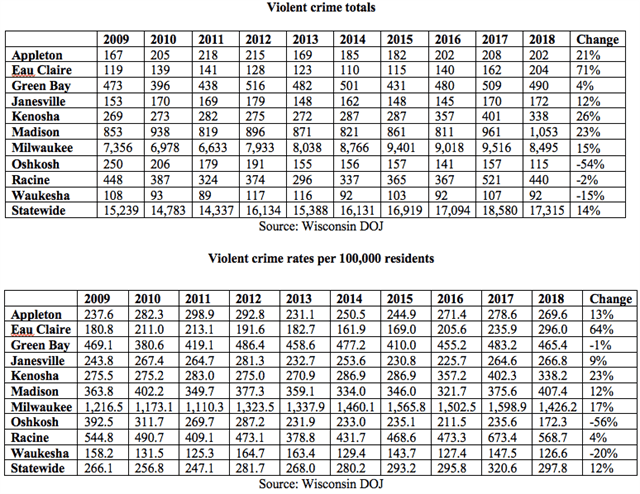Badger Institute analysis shows the rate is much lower, and complicated crime reporting makes comparisons difficult
While debating a “Tougher on Crime” legislative package in recent weeks, state lawmakers and pundits repeatedly have claimed that violent crime — murder, rape, aggravated assault and robbery — is up 24% statewide in Wisconsin.
That is inaccurate.
The state’s violent crime rate is up approximately 12% since 2009 and up roughly 10% over that period outside Milwaukee, according to a Badger Institute analysis of the latest Wisconsin Department of Justice (DOJ) numbers.
Statewide property crime rate — which includes burglary, larceny and motor vehicle theft — plummeted about 40% in the meantime and decreased about 48% in Milwaukee, according to FBI data.
The Institute’s analysis, which found dramatically different crime trends in differing parts of the of the state, calls into question the value of citing statewide numbers. An individual who lives in Milwaukee, for instance, is 10 times as likely to be a victim of a violent crime as a person who lives just to the west in the city of Waukesha. Almost half of all violent crime in the state occurs in Milwaukee, while there are vast swaths of Wisconsin where very little violent crime occurs at all, and even less than 10 years ago.
Comparing crime in recent years to crime a decade earlier is also problematic because of changes in the way incidents are reported.
Even agreeing on the best source of data is difficult. There are three different sets of commonly used data, and all three are at least slightly different.
According to the FBI’s Crime Data Explorer, for example, the violent crime rate in Wisconsin increased 14% from 2009 to 2018 (the last year of data available). According to another FBI online source, the Crime in the United States dataset, the violent crime rate increased 15% over this period. But according to the state DOJ dataset, the violent crime rate increased 12%.
The Badger Institute relied on one of the FBI datasets for property crime data because the DOJ’s numbers were not readily available. The Institute relied primarily on the state DOJ for violent crime data because it is the most up to date.
But both FBI and DOJ data is less than perfect when trying to make comparisons to years past. For decades, local police departments across the country compiled only “summary-based” reports. That began to change for at least some departments in the United States in 1991 when the FBI began encouraging the use of much more comprehensive “incident-based reporting” instead.
Incident-based reporting collects data for 49 offenses and includes information on the victim, offender, property and arrestee. It also counts up to 10 offenses per incident, whereas “summary reporting” only counts the most serious incident that occurs and aggregates data for just 10 offense categories.
All municipalities are being encouraged to use incident-based reporting by 2021, but only 174 of the more than 300 municipalities in Wisconsin have made the transition, and 81 are still in the process of converting.
According to a 2015 FBI analysis, using incident-based reporting probably drives up the number of reported crimes by approximately 2%. The state DOJ converts all incident-based reports back to the earlier “summary-based” format for comparison purposes but recognizes that the new reporting practices and conversions of data probably affect reported rates slightly.
A few other factors further complicate crime reporting.
In 2017, Wisconsin complied with the FBI’s new definition of rape, a more comprehensive definition that appropriately included more offenses. Numbers reported by most police departments reflected increases in this offense in 2017 and 2018, which may, in turn, affect the 10-year comparisons.
Much of the reporting and discussion of crime in Wisconsin in recent weeks have focused on the erroneous claim that violent crime is up 24% statewide. That claim was a misquote of a statistic in a Wisconsin Policy Forum publication that stated that violent crime was up 24% in the state’s 10 largest cities. That Policy Forum statistic, meanwhile, was also problematic because it cited data only through 2017. Violent crime rates in Wisconsin decreased 7% from 2017 to 2018 statewide and were down substantially in most of the big cities.
In fact, violent crime (both in actual number and rate) in Milwaukee decreased 11% from 2017 to 2018.
Crime numbers and rates are important indicators of public safety. They influence perceptions of crime, cause feelings of unease or security among residents and affect decisions made by public officials. That’s why accurate reporting and representation of these data is crucial — as is an effort to differentiate between different regions and acknowledge changes in reporting methods over time.
Below are charts detailing the number of violent crimes and rates in Wisconsin’s 10 largest cities from 2009 to 2018.

Julie Grace is a Badger Institute policy analyst.




